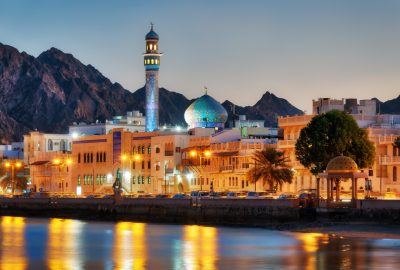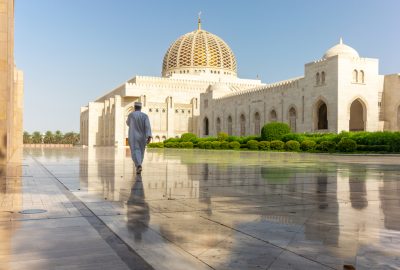Muscat, the capital of Oman, has the status of a global city. That means it’s a crucial node in the world’s economic system. I bet you’re thinking about all the petroleum, the LPG, and whatnot. It’s not just that, Muscat is one of the most multicultural cities in the region. The Omani are known for their legendary hospitality. They’re open to tourists, especially those willing to learn about Islam. That means a lot in these hyper-orthodox countries. You won’t see any of those ridiculous projects like in Abu Dhabi. In fact, Muscat is a very compact city, literally. Mountains surrounding it prevent further expansion. People are relatively down to earth here. They don’t build artificial islands. They don’t need to be the best in the world at everything. That doesn’t mean they don’t have some extraordinary landmarks. There is no better place to experience Islam than the Sultan Qaboos’ Grand Mosque. It’s gorgeous, even if you’re not a believer. The world's second-largest chandelier is its most priced treasure. This giant piece of crystal, gold, and jewels weighs over 9 tons. They also had the largest carpet in the world. UAE and Qatar would not stand for such an insult, so they wove their carpets 10cm longer. I’m not joking, these countries have this kindergarten rivalry between them. Just visit the mosque. It’s really cool, literally, as it’s made of Indian sandstone.
Muscat is the seat of power of the Sultans. The previous one, Qaboos bin Said, was universally beloved. He’s the one responsible for the massive growth of Oman. Al Alam Palace and the Royal Opera House are just two pieces of his legacy. All the changes that happened, especially the cultural ones, are all thanks to him. Women can drive cars, get an education, and even run their own businesses. It’s still frowned upon by some old-school Muslims, but most Omani practice a very open-minded branch of Islam. They even have the first fully female Omani sailing team. Want to see something cool? Wake up early, grab a coffee and head for the bay. When you have a bit of luck you’ll see the dolphins playing around, which is a rare sight these days. Water has always been a major part of Muscat’s livelihood. I mean, before the fossil fuels. It used to be a simple fishing village for centuries. They still practice that trade on the outskirts and around Old Muscat.

Muttrah Corniche: the atmospheric promenade in Muscat, which is surrounded by mountains on one side and the sea on the other; the main walking route of the capital of Oman
Muttrah was the heart of Muscat before the discovery of oil. It was one of the most prominent and busy ports in the region. And it still is, to be fair. While having a stroll along Muttrah Corniche at the seaside, be sure to also heck out the Muttrah Souq. It’s one of the oldest marketplaces in the world and one of the city’s main tourist attractions. The main aisle is where most of the tourists roam, but the market is vast. I hate getting pestered by vendors in these places, so I would go straight to the back alleys. Those tiny corridors stretch out into a convoluted labyrinth of sensual overload. If you’re planning to buy, you better get your haggling skills on point. What is there to buy? Expect gold, jewellery, spices, textiles, and traditional clothing, for the most part. The Omani have a thing for sandals, you’ll see a lot of those around. There are stalls with mountains of frankincense and halwa. Frankincense is a resin from a special kind of tree. It was burned for ritualistic purposes for thousands of years. Nowadays people burn it, or extract the aroma for perfume. I heard some are experimenting with frankincense-flavoured ice cream.
Muscat comes alive during evenings, when it’s cool enough to survive outside. The cultural change is a slow one and most Omani still don’t drink alcohol. They can apply for a license to drink at home, but doing it outside is against the law. Outsiders can get smashed at designated hotels and restaurants. Keep in mind that you’re definitely getting fined if caught drunk in public. The corniche and the beaches are popular during the evenings. The breeze is such a relief after a long day in these climates. As for the food, go see The Cave. It’s kind of a super fancy food court, carved into rock and there are several restaurants to pick from.




No one commented yet. Be the first.